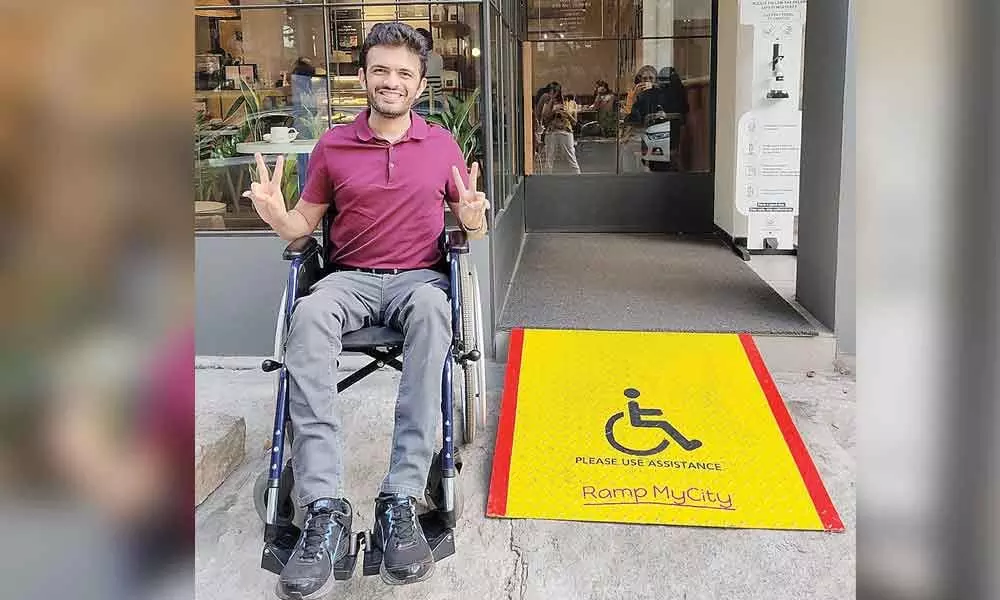Live
- Former MLA was ready to marry ‘fraudster’ Shweta Gowda
- Horoscope Today, December 26, 2024: Check Here for Astrological Daily Predictions
- KTR Condemns Arrest of Errolla Srinivas, Calls it an Unjust Act
- Meeting of Film Industry Leaders with CM Revanth Reddy
- Heavy Rush of Devotees at Tirumala Temple
- Belagavi meet is Jai Bapu-Jai Bhim-Jai Samvidhan convention
- Four Karnataka soldiers martyred in J&K Army vehicle accident
- Madhya Pradesh to translocate 14 tigers to Gujarat, Chhattisgarh, Odisha
- Shiva Rajkumar gets cancerous bladder removed in US
- Modi: Ambedkar's vision neglected by Congress
Just In
New phase of RampMyCity to make more places accessible to disabled


New phase of RampMyCity to make more places accessible to disabled
The next phase of RampMyCity has been launched in the city. Currently, famous streets in Bengaluru like Church Street and DVG Road are being transformed entirely to make them completely accessible for disabled people.
Bengaluru: The next phase of RampMyCity has been launched in the city. Currently, famous streets in Bengaluru like Church Street and DVG Road are being transformed entirely to make them completely accessible for disabled people.
"The idea is to make maximum spots within these locations completely accessible. People who are disabled are constantly in the flux of having to choose hang-out spots that are open to them and this project is a solution to this. With the completion of this project, Church Street and DVG Road will transform into the most accessible locations in the city", said Prateek Khandelwal, the founder of RampMyCity. Currently, the company has confirmed that eight ramps are being set up in Church Street.
The challenge is not to just install ramps but to make places accessible for disabled people, says Prateek Khandelwal.
It all started when Khandelwal survived an accident in 2014 and was bound to a wheelchair for the rest of his life. But with time, he realised that he wasn't able to mobilise his wheelchair to most locations. Some of them did not have ramps, hindering his inability to enter these spots themselves. "Whether I wanted to follow a career or visit a restaurant or travel, everything was inaccessible," said Prateek Khandelwal.
He went through the laws and guidelines in place especially 'The Rights of Persons with Disabilities (RPwD) Act, 2016' and realised that accessibility remained only an idealistic idea. There were only stranded efforts by NGOs and activists but nothing breathed confidence about his resumption to normalcy.
In 2018, with the motto of providing accessibility infrastructure for disabled people, Prateek started RampMyCity to build ramps in several parts of Bengaluru. He started approaching the nearby restaurants to provide accessibility for him. But it soon expanded to a chain of restaurants, schools, sports academies, and hotels.
"The first step is to construct a ramp but the solution should not end there," said Prateek. Ramps were an add-on solution and required no changes to the existing building structure and hence was easily accepted by most people.
Though RampMyCiry approaches these building owners, the cost of expenditure is borne by the owner himself. But, this also posed bigger concerns about ROI on these expenses. "We try to educate the building owners about how diversity and inclusivity can add to their brand value and has the potential to bring in more customers" he added. He added that key thing is to influence the mindset of people about these changes.
RampMyCity also educates building owners about accessibility issues within the building. They inform them on how to train their staff to effectively talk with a physically challenged person or how to construct washrooms that are more usable for those physically challenged. Most employees in various sectors are unable to answer questions posed by disabled people.
But the limitations dont not end here. Starting from a person leaving the premises of their home, a person faces issues accessing various facilities in their apartment, sitting in a cafeteria, boarding public transport and so on. Every sector suffers from accessibility issues as most infrastructures are built with an able person in mind. "People are building ramps to get clearance from BBMP but they are not designed as per standards" he added.
"In India, accessibility efforts are barely available and our efforts in Bengaluru is huge momentum in the right step. There are gaps in the society but our movement is creating confidence that these gaps can be filled" added Prateek.
"As far as government buildings are concerned, there are rules and regulations in place but the implementation is very slow. Their whole mission of developing places with accessibility has been on the back-burner" added Prateek. He added that a lot of initiatives get stuck as they wait for government approval But RampMyCity is optimistic about the government's
engagement with them based on their good work.

© 2024 Hyderabad Media House Limited/The Hans India. All rights reserved. Powered by hocalwire.com






